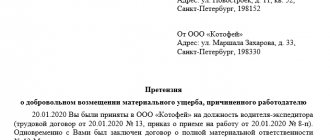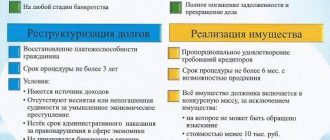( 1 votes, average rating: 5.00 out of 5)
lawyer Court
The issue for litigation between two parties to a dispute is a violation of civil law. The plaintiff writes a statement asking to protect him from the unlawful actions of another person; the accused party (defendant) can challenge the claim by any means.
What are the reasons for refusing a claim?
The applicant can waive the claims orally at the court hearing and in writing, having prepared a document in advance. According to the Civil Procedure Code, written documents are filed with the case materials, and oral documents are entered into the protocol.
Note!
Article 173 of the Code of Civil Procedure of Russia notes that abandonment of a claim is a voluntary expression of the will of the applicant, the reasons for which are the cessation of violations of rights by the defendant and the satisfaction of the conditions of the appeal in order to protect civil rights and interests.
Also, during the legal proceedings, the parties can come to an amicable agreement.
Based on Article 134 of the Civil Procedure Code, representatives of the judiciary have the right to refuse to consider a claim. The reasons for such refusal are:
- consideration of claim conditions within another process;
- The court has already made a decision on this dispute and the case is at the stage of enforcement proceedings.
Note!
The court will refuse the claim if there is a decision by the arbitrator.
If an appeal is refused to be accepted in order to protect civil rights and interests, the representative of the law is obliged to give a reasoned written decision that can be appealed.
Comment on the rating
Thank you, your rating has been taken into account. You can also leave a comment on your rating.
Is the sample document useful?
If the document “Sample.
Application to change the subject of the claim" was useful for you, we ask you to leave a review about it. Remember just 2 words:
Contract-Lawyer
And add Contract-Yurist.Ru to your bookmarks (Ctrl+D).
You will still need it!
Consequences of refusal of claims of the Civil Procedure Code
Based on the rule of law enshrined in Article 173 of the Civil Procedure Code, a representative of the judiciary must explain to the parties the consequences of abandoning claims. Paragraph 1 of Article 101 of the Code of Civil Procedure of the Russian Federation establishes the rule of law according to which the applicant’s refusal of the claim entails material costs.
Note!
The costs associated with the legal proceedings are borne by the plaintiff, and the applicant will also be forced to compensate the defendant for his expenses.
When the plaintiff refuses his conditions because they are satisfied, the court has the right to decide to impose costs on the defendant.
In 2013, the Supreme Arbitration Court of Russia issued Resolution No. 3862/13, which also explains the consequences of abandoning the claim: the applicant’s will must be aimed at terminating the process due to the loss of interest in the judicial consideration of the dispute and unwillingness to further use judicial protection mechanisms.
According to the Arbitration Procedural Code, the applicant’s voluntary renunciation of his claims in the trial presupposes the further impossibility of resolving this dispute in court. This legal norm is enshrined in Part 3 of Article 151 of the Arbitration Procedure Code of the Russian Federation.
How to correctly determine the subject or basis of a claim
A person must understand that a correctly drawn up application determines whether the document will be accepted for consideration or not, as well as the amount of possible compensation.
It is necessary to act logically and build smooth conclusions. This will allow you to develop a specific algorithm of actions that will help you draw the appropriate conclusions:
| Stages | Description |
| First | Initially, you should analyze the events preceding the controversial situation. The claim must be based on some negative aspects, for example, they did not repay the debt, caused damage to property assets, or evaded payment of alimony. These factors are grounds for filing a complaint against the other party. Such offenses must fall under a violation of one of the articles of the Code of Civil Procedure or the Arbitration Procedure Code of the Russian Federation |
| Second | Then there is a generalization of the existing circumstances of the case. These factors are the basis for writing a statement in which the plaintiff must express his claim against the opponent so that the court can make a fair decision. It is the listed requirements that are the subject of the claim, which is established on the basis of the available grounds. |
The plaintiff will need to collect various certificates and papers from government agencies. In addition, it will be necessary to carry out laboratory diagnostics in specialized companies with special permission. The final conclusion is issued to the applicant in the form of a report or act.
Waiver of part of claims sample
Part one of Article 39 of the code regulating procedural issues in civil cases reserves the plaintiff’s right to change the subject and basis of the application, to put forward demands related to an increase/decrease in the claim. Citizens can also refuse certain requirements. The refusal is submitted in a free form, but in judicial practice there is a generally accepted pattern of refusal of part of the claims.
To the Moskovsky District Court
Moskovsky pr., 129, St. Petersburg, 196006
Plaintiff: Anna Ivanovna Kozlova,
living at the address: Novoizmailovsky Prospekt, 12, apt. 5
STATEMENT
on partial waiver of claims
I, Kozlova A.I., filed a claim against Ivanov I.D. for the collection of alimony and division of joint property. The defendant fulfilled his financial obligations voluntarily, and therefore I renounce the previously made demands regarding the collection of alimony.
I ask you to accept the waiver of part of the claims.
The issue of division of property will continue to be resolved in court.
Attachment: copies of payment transfers indicating payment of alimony
12/20/2018 Kozlova A.I.
The Supreme Court reminded the courts of the procedure for changing the classification of controversial legal relations
The Supreme Court issued Determination No. 78-KG20-23-KZ, in which it reminded the courts that when changing the classification of controversial legal relations, it is necessary to bring this issue up for discussion between the parties and determine the circumstances relevant to resolving the dispute.
Sergei Robul filed a claim with the Kalininsky District Court of St. Petersburg against Sergei Mitin for the collection of debt under the loan agreement, interest for the use of other people's funds and legal expenses. He indicated that on February 3, 2011, the defendant borrowed 774 thousand rubles from him. for a period on demand, for which a receipt was drawn up. On March 7, 2021, Sergey Robul sent the debtor a demand for the return of funds within thirty days from the receipt of this demand, but the money was not returned and Sergey Mitin did not respond to the claim dated March 13, 2021.
Having clarified the claims, Sergei Robul asked to recover from the defendant the amount of the principal debt - 774 thousand rubles, interest for the use of other people's funds in the amount of more than 20 thousand rubles. and almost 10 thousand rubles. as compensation for legal expenses.
In collecting the amounts claimed by him in favor of the plaintiff, the Kalininsky District Court of St. Petersburg proceeded from the fact that the submitted receipt does not confirm the fact of the conclusion of the loan agreement, however, the funds received by the defendant constitute his unjust enrichment and are subject to recovery in favor of the plaintiff. The appeal and cassation upheld the decision of the first instance, agreeing with such conclusions.
Sergei Mitin appealed to the Supreme Court, which, having studied the cassation appeal, recalled that, by virtue of Art. 39 of the Code of Civil Procedure, the subject and basis of the claim are determined by the plaintiff, and the court, in accordance with Part 3 of Art. 196 of this Code makes a decision on the stated requirements.
The highest authority referred to paragraph 5 of the Resolution of the Plenum of the Supreme Court of the Russian Federation of December 19, 2003 No. 23 “On the court decision”, according to which the court makes a decision only on the claims stated by the plaintiff. The court has the right to go beyond the stated requirements (to resolve a claim that was not stated, to satisfy the plaintiff’s claim in a larger amount than it was stated) only in cases expressly provided for by federal laws. The stated claims are considered and resolved on the grounds specified by the plaintiff, as well as on the circumstances brought up by the court for discussion in accordance with Part 2 of Art. 56 Code of Civil Procedure of the Russian Federation.
At the same time, the Supreme Court noted, in paragraph 9 of the Resolution of the Plenum of the Supreme Court of June 23, 2015 No. 25 “On the application by courts of certain provisions of Section I of Part One of the Civil Code of the Russian Federation” it is explained that in accordance with Art. 148 of the Code of Civil Procedure, at the stage of preparing a case for trial, the court brings up for discussion the issue of the legal qualification of the legal relationship to determine which rules of law are to be applied when resolving the dispute. Within the meaning of Part 1 of Art. 196 of this Code, the court determines which rules of law should be applied to the established circumstances. The court also indicates the reasons why it did not apply the rules of law referred to by the persons participating in the case. In this regard, the plaintiff’s reference in the statement of claim to norms of law that are not subject to application in this case does not in itself constitute grounds for refusal to satisfy the stated claim.
The Supreme Court pointed out that in paragraph 6 of the Resolution of the Plenum of the Supreme Court of June 24, 2008 No. 11 “On the preparation of civil cases for trial” it also explained that when determining the law and other normative legal act that should be followed in resolving the case, and When establishing the legal relations of the parties, it should be borne in mind that they must be determined based on the totality of data: the subject and basis of the claim, the defendant’s objections to the claim, and other circumstances that have legal significance for the correct resolution of the case. Since the basis of the claim is factual circumstances, the plaintiff’s indication of a specific legal norm in support of the claim is not decisive when the judge decides the question of which law should be followed when resolving the case.
The Supreme Court drew attention to the fact that in the present case, the plaintiff filed demands for the recovery of a sum of money and interest from the defendant, in support of which he refers to the fact that this sum of money was transferred to the defendant. He considered these legal relations to be a loan and referred to the provisions of Art. 809 and 811 Civil Code. The first instance considered that the norms of Chapter. 60 of the Civil Code on unjust enrichment of the defendant due to the lack of proof of the fact that the parties entered into a loan agreement.
The highest authority noted that in accordance with Art. 12 of the Code of Civil Procedure of the Russian Federation, justice in civil cases is carried out on the basis of adversarial law and equality of the parties. According to paragraph 2 of Art. 56 of this Code, the court determines what circumstances are important for the case, which party must prove them, and brings the circumstances up for discussion, even if the parties did not refer to any of them.
“By virtue of these norms of procedural law and taking into account the above explanations of the Plenum of the Supreme Court of the Russian Federation, the court, having come to the conclusion that the disputed legal relationship was qualified as unjust enrichment, was obliged to raise this issue for discussion by the parties and determine the circumstances relevant to resolving the dispute, even if the parties did not refer to some of them, and also distribute the responsibilities for proving these circumstances,” the Supreme Court considered.
The Supreme Court noted that, according to the case materials, these legal requirements were not met by the court. At the same time, in his cassation appeal, Sergei Mitin indicated that as a result of this violation, he was deprived of the opportunity to state his objections to the recovery of unjust enrichment and present relevant evidence.
Thus, the Supreme Court overturned the decisions of the lower authorities and sent the case for a new trial to the Kalininsky District Court of St. Petersburg.
In a commentary to AG, lawyer at Khalimon and Partners Law Firm Alexander Bobrov pointed out that the Supreme Court quite rightly reminded lower authorities that justice in Russia is based on the principles of adversarialism and equality of participants in legal proceedings. “Indeed, the current procedural legislation vests the court hearing the case with broad procedural powers, the use of which, in particular, is intended to direct the parties to the effective implementation of their rights and, as a result, to comprehensively and fully consider a specific dispute. At the same time, when directing the procedural behavior of the parties, the court should not assume powers inherent only to the parties,” noted Alexander Bobrov.
In his opinion, such cases occur in judicial practice, although they are not widespread. “It is a generally accepted practice in which a judge considering a case and believing that other rules should be applied to the relations that have arisen between the parties, different from those referred to by the plaintiff, explains to him the right to clarify the requirements. Procedurally, this is realized through filing an application to change the subject or basis of the claim in accordance with Part 1 of Art. 39 of the Code of Civil Procedure of the Russian Federation,” the lawyer emphasized.
Lawyer of the United Bar Association of the Chuvash Republic Sergei Vanyukov noted that the Supreme Court invites the courts, in case of disagreement with the legal qualification of the legal relations of the parties proposed by the plaintiff, not to refuse the claim, but in preparation for the court hearing to offer their qualification of the legal relations of the parties and bring it to the attention of discussion, identifying the circumstances relevant to resolving the dispute and distributing the burden of proof between the parties.
“This approach, on the one hand, provides procedural time savings, and on the other hand, allows us to reduce the requirements for the legal qualifications of the parties,” he said. Sergei Vanyukov noted that cases of disagreement of courts with the classification of legal relations proposed by the parties are not uncommon, and therefore the determination of the Supreme Court has practical value.
Application for partial waiver of claims
The application is considered in court proceedings in accordance with Article 39 of the Code of Civil Procedure of the Russian Federation. The procedural norm provides for the written and oral submission of such an appeal.
The court may not accept a refusal due to the inconsistency of the application or violation of the rights of third parties.
An application for partial refusal is submitted in free form to the court in which the application is being considered for the purpose of protecting civil rights and interests, indicating the data of the applicant and the defendant, the circumstances of the statement of claim and information about those claims that the plaintiff is waiving.
Sample application to a court of general jurisdiction to change the subject of a claim in a civil case
There are no mandatory requirements for the form and content of the application. We recommend that you indicate the case number, briefly describe the circumstances of the dispute, and provide the old and new subject of the claim.
The sample was prepared using the example of a situation where the plaintiff (customer) first demanded that defects in the work be eliminated free of charge, and now asks to reduce the price he paid for this work.
October 14, 2021 Cheryomushkinsky District Court 117218, Moscow, st. Krzhizhanovsky, 20/30, building 3 Case No. 02-29876/2019 Judge Shestakov A.A.
Plaintiff (applicant, customer): Limited Liability Company "Andromeda" Address: Dubininsky Prospect, 22/33, Moscow, 124632 Telephone Email
Defendant (contractor): Matveev Andrey Sergeevich Place of residence: st. Zefirnaya, 1, apt. 1, Moscow, 100120 Telephone Email Date of birth: 03/08/1980, place of birth: Moscow TIN 773400517933 Place of work: LLC "Med" Address: Lyublyansky pr-d, 3, Moscow OGRN 1097745864262, TIN 7721288213
Motion to waive claims
A motion to waive claims is a type of appeal to the court that does not exist in legal practice. Based on the Civil Code, the plaintiff must express his desire to terminate the litigation in the form of an appeal to the court orally or with a written statement.
Article 35 of the Civil Procedure Code provides for the possibility for citizens to file petitions on the merits of the case under consideration. In legal practice, a petition is a written request addressed to the court and aimed at initiating an action, and not stopping it.
Note!
The defendant has the right to file a petition for consideration of a counter-application in order to protect civil rights and interests in a single judicial process.
The court will satisfy this petition and accept a counterclaim, guided by the provisions of Article 138 of the Civil Procedure Code. To do this, the counter-application must contain requirements aimed at setting off the original document. Satisfaction of the counter appeal will exclude the possibility of satisfying the first one and there is a connection between the claims - their joint consideration will lead to the correct decision.
Leave a comment on the document
Do you think the document is incorrect? Leave a comment and we will correct the shortcomings. Without a comment, the rating will not be taken into account!
Thank you, your rating has been taken into account. The quality of documents will increase from your activity.
| Here you can leave a comment on the document “Sample. Application to change the subject of the claim”, as well as ask questions associated with it. If you would like to leave a comment with a rating , then you need to rate the document at the top of the page Reply for |
Consideration of the application
You can submit a document at any time before the court goes to the deliberation room.
The law does not limit the number of times a petition can be filed, but changing the requirements too often, if there is no real reason behind it, can be regarded as an attempt to delay the legal process. Attention! The petition can be submitted either directly at the hearing or through the court office. It is allowed to send the document by mail. In this case, it is recommended to use a registered letter with notification and a description of the attachment.
The court has the right to adjourn the hearing to examine new information. The defendant also has the right to request a transfer of the case, but after accepting the clarification and change in the nature of the demand, since he will need time to study new material and prepare his objections.
The outcome of consideration of the petition is the issuance of a ruling by the court. The text may indicate both acceptance and refusal of the submitted petition. But the refusal must be motivated.









